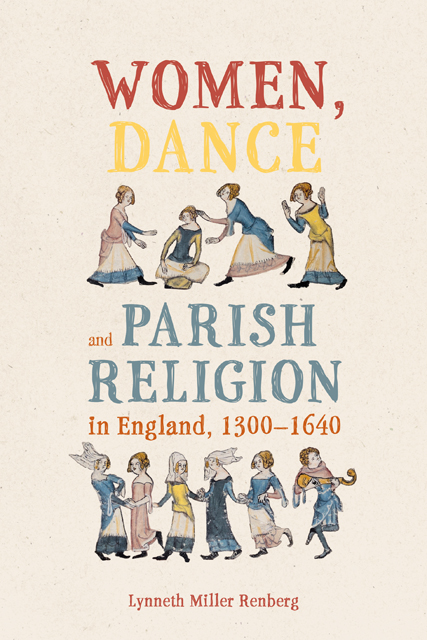Book contents
- Frontmatter
- Dedication
- Contents
- Acknowledgments
- List of Abbreviations
- Introduction
- 1 Reforming and Redefining True Religion
- 2 Dance and Protecting Sacred Space
- 3 Dance and Disrupting Sacred Time
- 4 “Satan Danced in the Person of the Damsel”
- 5 “In Her Dance She Had No Regard Unto God”
- 6 Performing Dance, Sin, and Gender
- Conclusions
- Appendix
- Timeline
- Bibliography
- Index
- Gender in the Middle Ages
6 - Performing Dance, Sin, and Gender
Published online by Cambridge University Press: 17 December 2022
- Frontmatter
- Dedication
- Contents
- Acknowledgments
- List of Abbreviations
- Introduction
- 1 Reforming and Redefining True Religion
- 2 Dance and Protecting Sacred Space
- 3 Dance and Disrupting Sacred Time
- 4 “Satan Danced in the Person of the Damsel”
- 5 “In Her Dance She Had No Regard Unto God”
- 6 Performing Dance, Sin, and Gender
- Conclusions
- Appendix
- Timeline
- Bibliography
- Index
- Gender in the Middle Ages
Summary
The foote is an vnhappy member, and carries a man to much wickednesse … There is a foote of pride, Psal. 26, a sawcie foote, that dares presumptuously enter vpon Gods free-hold. There is a foote of rebellion, that with an apostate malice kickes at God. There is a dauncing foote, that paceth the measures of circular wickednesse.” In a stark contrast with medieval exhortations to “dance to God,” most early modern sermons focused on dance as a profane action, and on “dancing to hell.” Roger Edgeworth’s 1557 sermon is one such example: “most of part people … will not walke in the streyght way that bringeth a man to heauen, but had leauer keepe the brode waye of pleasure, easelye hopping and dauncing to hell, and therefore to them heauen is a wilderness.” Many similar sermons asserted that for dancers, heaven was a wilderness that could never be conquered, as does this sermon from 1589:
I know not surely how we practise now a daies to get heauen by violence, vnlesse eating and drinking, banqueting and sporting, daunsing and vising, swearing, and staring, bee violence. If this violence, or the like kinde would get heauen, perhaps a number should come to Heauen, who for vsing the same shall bee assured neuer to come there, but violently to bee thrust into hel where they shal remaine and abide for euermore.
Dance, according to Anthony Tyrrell, could not be a spiritual practice, and dance ensured not entry into heaven but entry into hell.
These three sermons, with their negative presentations of dance and dancers, represent just a sample of over three hundred early modern sermons about dance. These sermons range in topic and in audience, with some presenting lengthy discussions of dance and others simply remarking upon dance in passing. Like their medieval predecessors, very few of these homilies take as their main text a passage that references dance specifically, instead drawing in references to dance to support their larger points and confirming the late medieval theology of dance almost accidentally. Many of these sermons were printed in London; almost as many were preached in London, and on the whole, these sermons are the products of Oxbridge-educated clerics known for their erudition and eloquence.
- Type
- Chapter
- Information
- Women, Dance and Parish Religion in England, 1300-1640Negotiating the Steps of Faith, pp. 157 - 186Publisher: Boydell & BrewerPrint publication year: 2022



